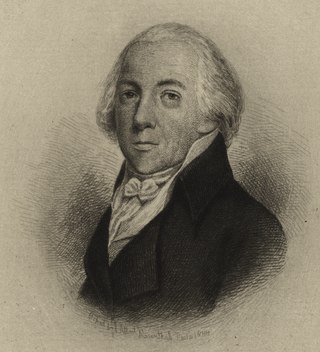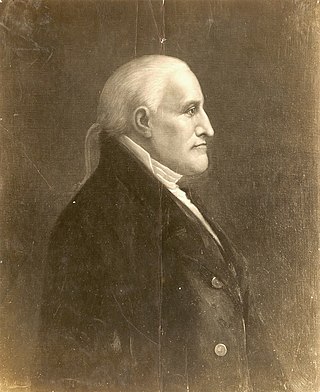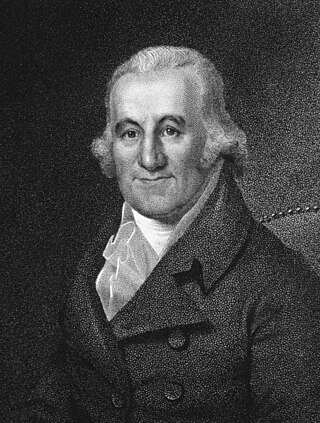
Benjamin Smith Barton was an American botanist, naturalist, and physician. He was one of the first professors of natural history in the United States and built the largest collection of botanical specimens in the country. He wrote the first American textbook on botany.

John Beatty was an American slave owner, physician, and statesman from Princeton, New Jersey.

Adam Kuhn was an American physician and naturalist, and one of the earliest professors of medicine in a North American university.

Charles Jared Ingersoll was an American lawyer, writer and politician who served as a Democratic member of the U.S. House of Representatives for Pennsylvania's 1st congressional district from 1813 to 1815, Pennsylvania's 3rd congressional district from 1841 to 1843 and Pennsylvania's 4th congressional district from 1843 to 1849. He served as a member of the Pennsylvania House of Representatives in 1830.

Caspar Wistar was an American physician and anatomist. He is sometimes referred to as Caspar Wistar the Younger, to distinguish him from his grandfather of the same name. The plant genus Wisteria is named for him.
James Armstrong was an American slave owner, physician, judge, and politician.

Daniel Drake was a pioneering American physician and prolific writer.

William Shippen Jr., was the first systematic teacher of anatomy, surgery and obstetrics in Colonial America and founded the first maternity hospital in America. He was the 3rd Director General of Hospitals of the Continental Army.

Thomas Story Kirkbride was a physician, alienist, hospital superintendent for the Institute of the Pennsylvania Hospital, and primary founder of the Association of Medical Superintendents of American Institutions for the Insane (AMSAII), the organizational precursor to the American Psychiatric Association. Along with Benjamin Rush he is considered to be the father of the modern American practice of psychiatry as a specific medical discipline. His directive and organization of institutions for the insane were the gold-standard of clinical care in psychiatry throughout the 19th century.

William Paul Crillon Barton, was a medical botanist, physician, professor, naval surgeon, and botanical illustrator.

Charles Delucena Meigs was an American obstetrician who worked as chair of obstetrics and diseases of women at Jefferson Medical College from 1841 to 1861. He worked as editor of The North American Medical and Surgical Journal and published multiple papers and books on various topics in obstetrics including thrombosis as a cause of sudden death in women during childbirth, diseases of the cervix and postpartum infections. He was a fellow of the College of Physicians of Philadelphia and served as president from 1845 to 1855.

Reynell Coates was an American physician, scientist, teacher, poet and politician.

Ebenezer Kingsbury Hunt was a prominent physician in Hartford, Connecticut.

George Bacon Wood was an American physician, professor, and writer from Pennsylvania.

Anna Lukens was an American physician from Philadelphia, Pennsylvania who practiced medicine, had leadership roles in hospitals and taught medicine. She was a vice-president of the New York Committee for the Prevention and State Regulation of Vice.

Dr. Henry Cadwalader Chapman was an American physician and naturalist.

John Redman Coxe was a physician and professor of medicine at the University of Pennsylvania.

Franklin Bache was an American physician, chemist, professor and writer from Pennsylvania. He taught chemistry at West Point Academy, the Franklin Institute, Philadelphia College of Pharmacy and Jefferson Medical College. He published several scientific textbooks including a pharmacopoeia with Dr. George B. Wood in 1830 that became the basis of the U.S. Pharmacopoeia and U.S. Dispensatory. He was the first American to perform original research on the study of acupuncture for the treatment of pain.
William Duncan was a prominent 19th-century American physician from Savannah, Georgia. During the American Civil War, he was the Confederate States Army's assistant surgeon with the 10th Georgia Infantry Regiment, and went on to become dean of Savannah Medical College and an alderman of the city.

















